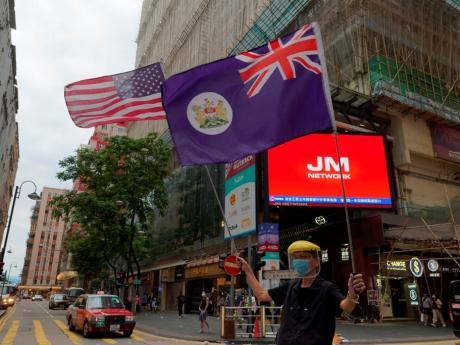Hong Kong police fire tear gas, water cannon at protesters
(AP) — Hong Kong police fired tear gas and a water cannon at protesters in a popular shopping district today, as thousands took to the streets to march against China's move to impose national security legislation on the city.
Pro-democracy supporters have sharply criticised a proposal, set to be approved by China's rubber-stamp parliament this week, that would ban secessionist and subversive activity, as well as foreign interference, in the semi-autonomous Chinese territory.
The pro-democracy camp says the proposal goes against the “one country, two systems” framework that promises Hong Kong freedoms not found in mainland China.
Crowds of demonstrators dressed in black gathered in the Causeway Bay district, chanting slogans such as “Stand with Hong Kong," “Liberate Hong Kong” and “Revolution of our times.”
The protest was a continuation of a months-long pro-democracy movement in Hong Kong that began last year and had, at times, descended into violence between police and protesters.
Police raised blue flags, warning protesters to disperse, before firing multiple rounds of tear gas. They later fired a water cannon at the demonstrators.
At least 180 people were arrested, mostly on charges of unlawful assembly, police said.
They also said that some of the protesters threw bricks and splashed unidentified liquid at officers, injuring at least four members of the police media liaison team. They warned that such behaviour is against the law and that police would pursue the matter.
Earlier in the afternoon, prominent activist Tam Tak-chi was arrested during the protest for what police said was unauthorised assembly. Tam said he was giving a “health talk” and was exempt from social-distancing measures that prohibit gatherings of more than eight people.
The bill being protested
The bill that triggered today's rally was submitted at the opening of China’s national legislative session on Friday. It would bypass Hong Kong’s legislature and could allow mainland agencies to be set up in the city, sparking concern that Chinese agents could arbitrarily arrest people for activities deemed to be pro-democracy.
Speaking at an annual news conference during the legislative session, Chinese Foreign Minister, Wang Yi said Hong Kong affairs were an internal matter for China, and that “no external interference will be tolerated.”
“Excessive unlawful foreign meddling in Hong Kong affairs has placed China’s national security in serious jeopardy,” Wang said, adding that the proposed legislation “does not affect the high degree of autonomy in Hong Kong.”
"It does not affect the rights and freedoms enjoyed by Hong Kong residents. And it does not affect the legitimate rights and interests of foreign investors in Hong Kong,” he said.
Criticism from western countries
US Secretary of State Mike Pompeo has called the proposal “a death knell for the high degree of autonomy” that Beijing promised the former British colony when it was returned to China in 1997.
Chris Patten, the last British governor of Hong Kong prior to its handover to China, lamented what he called “a new Chinese dictatorship.”
“I think the Hong Kong people have been betrayed by China, which has proved once again that you can’t trust it further than you can throw it,” Patten said in an interview with The Times of London.
Patten is leading a coalition of at least 204 international lawmakers and policymakers who are decrying the proposed legislation. In a statement, the coalition called it a "flagrant breach" of the Sino-British Joint Declaration, a 1984 treaty that promised Hong Kong a high degree of autonomy even after the handover of Hong Kong to China in 1997.
President Donald Trump’s national security adviser, Robert O’Brien, said it appeared that China was violating the 1984 treaty.
“And I can’t see how Hong Kong remains the Asian financial centre if the Chinese Communist Party goes through and implements this national security law and takes over Hong Kong,” O'Brien said on CBS' 'Face the Nation'.
“That would be a tragedy for the people of Hong Kong, but it will also be very bad for China,” he said.
Follow The Gleaner on Twitter and Instagram @JamaicaGleaner and on Facebook @GleanerJamaica. Send us a message on WhatsApp at 1-876-499-0169 or email us @onlinefeedback@gleanerjm.com or editors@gleanerjm.com.

